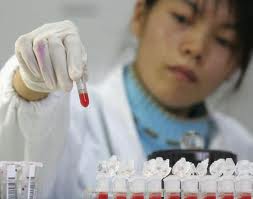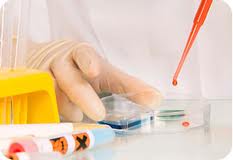 In my inbox yesterday was a story describing a new biological test for a psychiatric disorder. Hallelujah! Is this the holy grail we’ve all been waiting for?
In my inbox yesterday was a story describing a new biological test for a psychiatric disorder. Hallelujah! Is this the holy grail we’ve all been waiting for?
Specifically, scientists at Human Metabolome Technologies (HMT) and Japan’s Keio University presented data earlier this week at a scientific conference in Tokyo, showing that they could diagnose depression by measuring levels of a chemical—ethanolamine phosphate—in patients’ blood.
Let me repeat that once again, for emphasis: Japanese scientists now have a blood test to diagnose depression!
Never mind all that messy “talk-to-the-patient” stuff. And you can throw away your tired old DSM-IV, because this is the new world: biological diagnosis!! The press release describing the research even suggests that the test “could improve early detection rates of depression if performed during regular medical checkups.” That’s right: next time you see your primary doc, he or she might order—along with your routine CBC and lipid panel—an ethanolamine phosphate test. If it comes back positive, congratulations! You’re depressed!
 If you can detect the skepticism in my voice, good. Because even if this “biomarker” for depression turns out to be 100% accurate (which it is not—see below), its use runs entirely against how we should be practicing person-centered (not to be confused with “personalized”) medicine. As a doctor, I want to hear your experiences and feelings, and help you with those symptoms, not run a blood test and order a drug.
If you can detect the skepticism in my voice, good. Because even if this “biomarker” for depression turns out to be 100% accurate (which it is not—see below), its use runs entirely against how we should be practicing person-centered (not to be confused with “personalized”) medicine. As a doctor, I want to hear your experiences and feelings, and help you with those symptoms, not run a blood test and order a drug.
[Incidentally, the Asahi press release made me chuckle when it stated: “About 90 percent of doctors base their diagnosis of depression on experience and varying factors.” What about the other 10%? Magic?]
As it turns out, I think there’s a lot to suggest that this particular blood test may not yet be ready for prime time. For one, the work has not yet been published (and deciphering scientific results from a press release is always a risky proposition). Secondly, the test was not 100% accurate; it failed to identify depression in 18% of cases, and falsely labeled healthy people as “depressed” 5% of the time. (That’s a sensitivity of 82% and a specificity of 95%, for those of you playing along at home.)
Further, what the heck is ethanolamine phosphate, and why would it be low in depressed people? Is it a chemical secreted by the “happiness centers” of the brain? Does it predict the onset or worsening of a depressive episode? Is it somehow affected by antidepressant treatment? As far as I can tell from a quick literature search, there has been no report—or even a suggestion—of ethanolamine (or any of its metabolites) being involved in the pathogenesis of mood disorders. Then again, maybe I didn’t get the Japanese translation just right.
 Anyway, where this “marker” came from is anybody’s guess. It’s entirely possible (although I can’t be sure, because the Japanese group has not yet published their findings) that the researchers measured the blood levels of dozens of molecules and found the “best” results with this one. We sometimes call this a “fishing expedition.” Obviously, the finding has to be replicated, and if it was, in fact, just a lucky result, further research will bear that out.
Anyway, where this “marker” came from is anybody’s guess. It’s entirely possible (although I can’t be sure, because the Japanese group has not yet published their findings) that the researchers measured the blood levels of dozens of molecules and found the “best” results with this one. We sometimes call this a “fishing expedition.” Obviously, the finding has to be replicated, and if it was, in fact, just a lucky result, further research will bear that out.
But Dr Yoshiaki Ohashi, board director and chief security officer at HMT (“chief security officer”? does he wear a badge and sit at the front desk during the overnight shift, too?) maintains that the findings “will make it easier for an objective, biological diagnosis of depressive patients.”
Wow. In 2011. (And just in time for DSM-5.)
What if he’s right? How would you feel if you went to a routine doctor’s visit next week, got an order for blood work, and a secretary called you a few days later to tell you that you have depression? Even if you don’t feel depressed?
Were there other motives for developing such a test? Probably. One of the press releases quotes the Japanese Ministry of Health as saying that “only one quarter of the people who need treatment” actually get it. So maybe this blood test is simply a way to offer treatment to more people expand the market for antidepressants—even to those who don’t want treatment. And then, of course, HMT probably wants a piece of the pie. HMT is already developing a commercial test to measure ethanolamine phosphate levels; obviously, widespread adoption of this test would translate into big bucks for HMT, indeed.
 So while many other questions remain to be answered, I must say I’m not holding my breath. Biological screening tests for psychiatric disorders have no face validity (in other words, if a test is positive but a person shows no signs or symptoms, then what?) and a positive result may expose patients to “preventive” treatments that are costly and cause unwanted side effects.
So while many other questions remain to be answered, I must say I’m not holding my breath. Biological screening tests for psychiatric disorders have no face validity (in other words, if a test is positive but a person shows no signs or symptoms, then what?) and a positive result may expose patients to “preventive” treatments that are costly and cause unwanted side effects.
In my opinion, the best way (if any) to use a biomarker is in a “confirmatory” or “rule-out” function. Is that demoralized, ruminative, potentially suicidal patient in your office simply going through a rough period in her life? Or is she clinically depressed? Will she respond to medications, or is this something that will simply “pass”? In cases like this, measuring ethanolamine phosphate (or another similar marker) might be helpful.
But I don’t think we’ll ever be able to screen for psychiatric illness the same way a primary care doc might screen for, say, breast cancer or diabetes. To do so would redefine the entire concept of “mental” illness (perhaps making it “neurological” illness instead?). It also takes the person out of the picture. At the end of the day, it’s always the patient’s thoughts, words, and experiences that count. Ignoring those—and focusing instead on a chemical in the bloodstream—would be an unfortunate path to tread.

An excellent piece. I’ve posted it to my facebook page and pasted a link in a comment at Shrink Rap
“Is that demoralized, ruminative, potentially suicidal patient in your office simply going through a rough period in her life? Or is she clinically depressed?”
I don’t know if I’m reading this correctly, but this part seems to fundamentally ask: Can I construct a narrative for their symptoms or not? If not, then they are “clinically” depressed (as opposed to “narratively” depressed?). Does the “Or…” create a false dichotomy? This is an interesting sentence. I enjoy your blog.
Having only an undergrad pre-med background, I am going to guess that ethanolamine phosphate levels are related to the body’s production of neurotransmitters or in cell metabolism. Phosphates in general donate electrons to complex chemical reaction pathways that generally related to energy. Apparently, ethanolamine phosphate plays roles in how choline and other precursors to key neurotransmitters are utilized. A low level of this end-marker might mean the body is impaired in it’s ability to optimally produce them. If you think of it, nutritionally, fish and fish oil are important to the improvement of depressive symptoms–both of which play a role in the choline pathway.
If Fish Oil decreases depresive sx, then we know the person does not have a psychiatric illness, but a nutritional deficit, like scurvy. Same with impaired Folate absorption…if that’s the problem, then it’s not a psychiatric illness, but a General Medical Condition.
Re: Deplin. “7 out of 10 people with depression may have a specific genetic factor that limits their ability to convert folic acid or folate from the diet to L-methylfolate.” They have a General Medical Condition and the psychiatrist should refer them to their PCPs.
I doubt that these new blood tests add much to spending a bit of time talking to a patient. In truth, maximizing nutrition, exercise, reducing cognitive distortion and giving support will be on the menu for anyone suffering from depression. Would the test change what you do? Perhaps in some stubborn individuals (more likely to be seen in a primary care doc’s office than by a psychiatrist). If not, then don’t do the test.
Hi Emily,
“I doubt that these new blood tests add much to spending a bit of time talking to a patient.”
You’re absolutely right, and I think most psychiatrists are thoughtful enough to recognize this, and not to diagnose on the basis of a test alone. I’m just pointing out that people can get a little too enthusiastic about these “biomarkers.” They may tell us something about the disease (see my next post for a “better biomarker,” IMHO) but when it comes to treatment, the patient’s words and thoughts should receive priority.
Steve,
And of course, with any “miracle finding” will come a new “miracle drug”.
IMO, psychiatrists are missing the obvious when it comes to depression.. Namely that it can be treated in a much more holistic fashion, in a way that works!
Dissolving Biochemical Depression, Joan Matthews Larson, Ph.D. –
http://www.healthrecovery.com/HRC_2006/Depression_06/D_sadness_inside_you.htm
Duane Sherry, M.S.
Major Depressive Disorder (MDD) and Vitamin D.
From the Vitamin D Council –
http://www.vitamindcouncil.org/health-conditions/mental-health-and-learning-disorders/depression/
Duane Sherry, M.S.
This is my take on this, as a layperson and parent of a young adult with recurring depression:
I would love there to be a “biomarker” for depression. And I hope research will continue into such a thing. Perhaps this would allow people like my son to only take medication during an episode and be med-free the rest of the time. Or for people who respond to psychotherapy to time their sessions for maximum effect. And I could see such a thing being useful if we ever figure out the connection (if there is one) between depression and cognitive deficits.
But I know there is no one “depression” so there is unlikely to be one “biomarker.” The Japanese one here doesn’t seem to be of much use but I’ll still read the research paper when it’s published.
As you said, let’s wait for the peer reviewed study to be published in a reputable journal. I won’t be surprised to find that a company marketing this type of test funded the study. This seems to remind me of the old DST for depression phenomena that surfaced (and quickly sunk) in the 1980’s.
Post writing is also a excitement, if you be acquainted with
then you can write otherwise it is difficult to write.
Blood test can reveal some health conditions. That is why it is always a good idea to get some periodic blood test. ,
Most recently released content straight from our new web blog
http://www.foodsupplementdigest.com/vitamin-d-deficiency-fatigue/
Every year, about 10,,000 personally accepts the chronic
lymphocytic leukemia in US to diagnose. Doses are increased as they see that
patients are safely tolerating the drug until the
maximum safe dose is reached. Global – Data has found the existing competition in the sepsis therapeutics market
to be weak.